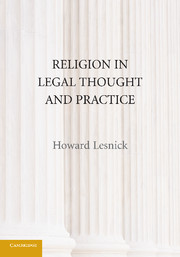Book contents
- Frontmatter
- Contents
- Preface
- I INTRODUCTIONS
- 1 Some Opening Prompts
- 2 Religion and the Life of a Lawyer
- II MORAL OBLIGATION AND RELIGIOUS BELIEF
- III RELIGION AND SOME CONTEMPORARY MORAL CONTROVERSIES
- IV THE INTERACTION BETWEEN RELIGION AND THE SECULAR LAW
- V RESPONDING TO RELIGIOUS DIVERSITY
- VI RELIGIOUSLY GROUNDED MORAL DECISION-MAKING IN PROFESSIONAL LIFE
- Copyright Permission Acknowledgments
- Authors of Works Reprinted
- Scriptural Passages
- Index
1 - Some Opening Prompts
Published online by Cambridge University Press: 05 June 2012
- Frontmatter
- Contents
- Preface
- I INTRODUCTIONS
- 1 Some Opening Prompts
- 2 Religion and the Life of a Lawyer
- II MORAL OBLIGATION AND RELIGIOUS BELIEF
- III RELIGION AND SOME CONTEMPORARY MORAL CONTROVERSIES
- IV THE INTERACTION BETWEEN RELIGION AND THE SECULAR LAW
- V RESPONDING TO RELIGIOUS DIVERSITY
- VI RELIGIOUSLY GROUNDED MORAL DECISION-MAKING IN PROFESSIONAL LIFE
- Copyright Permission Acknowledgments
- Authors of Works Reprinted
- Scriptural Passages
- Index
Summary
The book begins with several brief scriptural and quasi-scriptural passages intended to evoke thought regarding some fundamental questions with which religion deals and which this book hopes to address. Whatever your past or present stance is with respect to any religious tradition, I invite you to ask yourself what message you find in each passage, and how you respond to it.
RELIGION: AN UNLIKELY SAVIOR
The Moral Core of Judaism and Christianity: Reclaiming the Revolution
DANIEL C. MAGUIRE (1993)
It is not at all obvious at this point in history that the religions of the world have done more good than harm. Alexander Pope said that “the worst of madmen is a saint gone mad.” What is there in religion that makes its saints so mad? Among the ancient offspring of religion we find human sacrifice, magic, witch-hunts, pogroms, crusades, inquisitions, and holy wars. Today's religions look no more promising than yesterday's when we look to Northern Ireland, the Middle East, Afghanistan, or the Punjab. Religion seems more divisive than race.
One might well identify with the Latin poet who wondered how “religion could generate so many evils.” Was Lucretius not right in praising Epicurus for saving humankind from the “burden of religion”? A formidable burden of proof rests on anyone who would argue as I shall that a lost revolution of consciousness — one that could have a major, transforming impact on our modernity — is retrievably housed in the classic religions of Judaism and Christianity. Both Judaism and Christianity suffer from advanced decadence, a fact only timidly recognized by the institutional devotees of these religions.
- Type
- Chapter
- Information
- Religion in Legal Thought and Practice , pp. 3 - 11Publisher: Cambridge University PressPrint publication year: 2010

